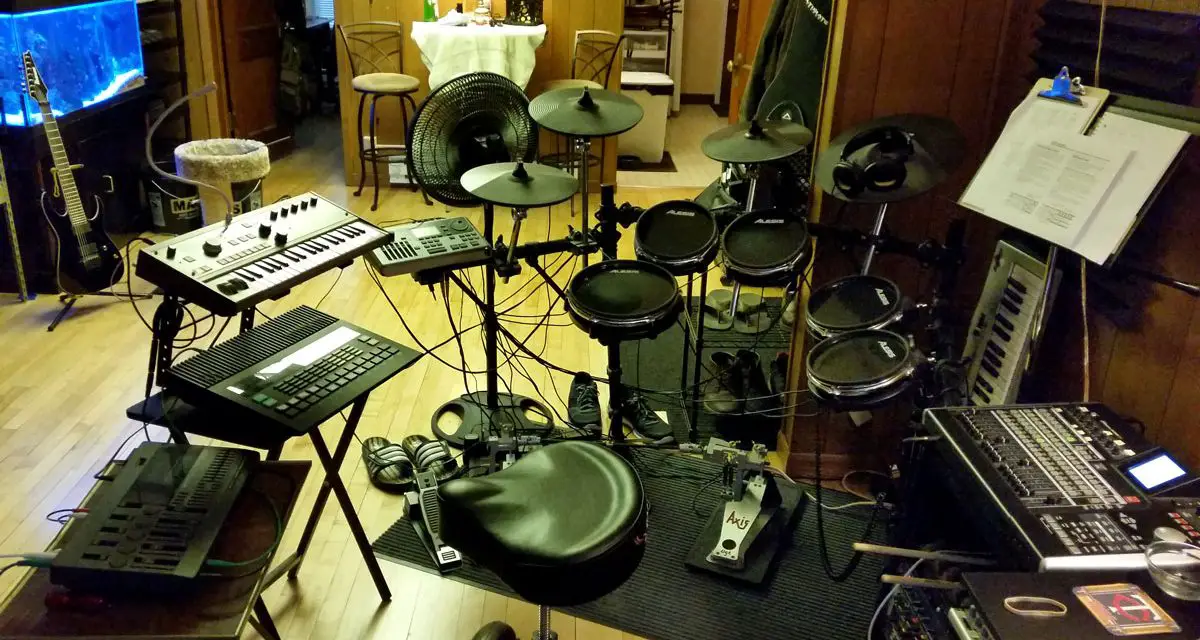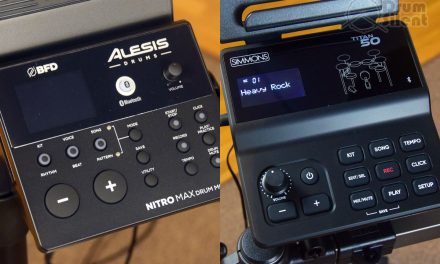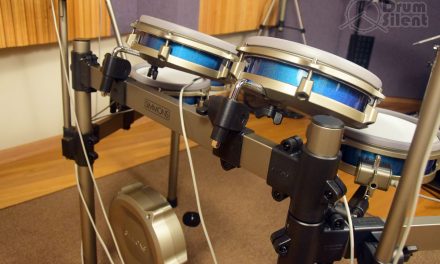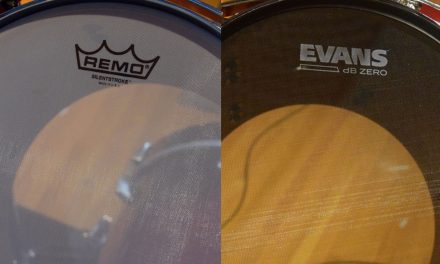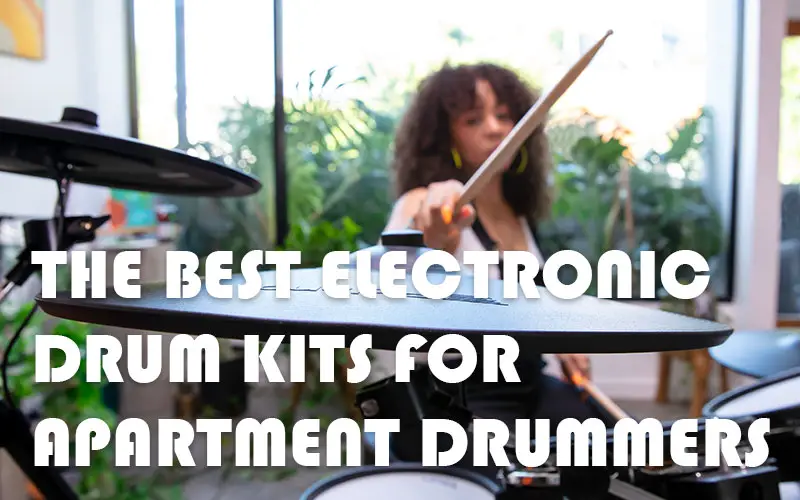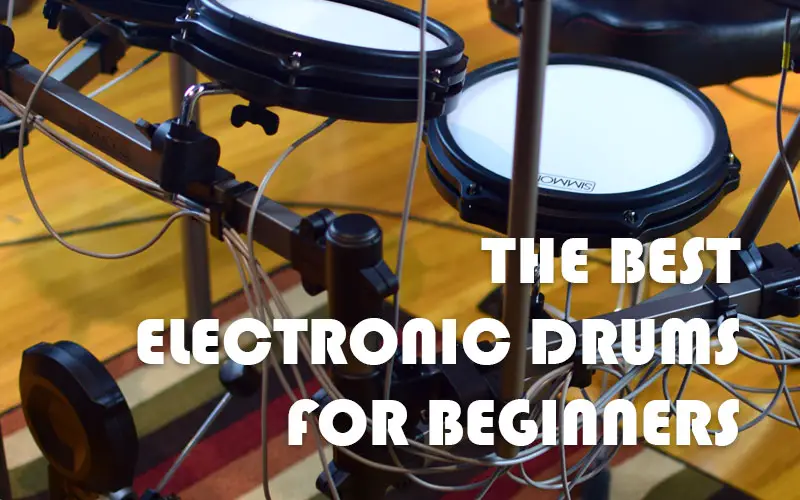The quick answer is usually no, it’s not ok to play drums in an apartment in most cases. However, the right combination of gear and circumstances can help you pull it off.
What Can Your Neighbors Actually Hear?
Different types of equipment will have varying levels of potential annoyance for your neighbors.
Muted Acoustic Drum Kits
If you’re playing a non-muted acoustic kit in an apartment you’re neighbors will hear everything and you’ll get noise complaints quickly. That should be pretty obvious. If you play a muted acoustic kit, you’re neighbors might hear the thumping of hitting the muted pads and cymbals, and they’ll still probably hear the thumping of the kick drum.
Electronic Drum Kits
If you’re playing an electronic kit, neighbors can still hear the tapping on the pads and most likely will be able to hear the thumping of the kick pad.
If you use drum pads with mesh drum heads, and focus on only hitting the mesh, that will take the sound level down quite a bit and neighbors might not hear that at all. However, there are still the cymbal pads and the kick drum pad to worry about, which are usually harder like practice pads and hard to keep completely silent.
Practice Pads
If you are using a practice pad, neighbors might be able to hear you tapping on that as well, but it’ll be very easy to isolate it from the floor to prevent any issues with downstairs neighbors being annoyed.
Apartment Noise is Sometimes Unavoidable
When you live in an apartment it’s often your neighbors who will be the ultimate judge of what types of noisy things you can get away with. And the judgement will come forms of complaint by knocking on your door and telling you to quiet down or calling the landlord and reporting your excessive noise.
We’ve all had noisy neighbors. Loud parties. Loud music. Stomping on floors. Watching loud movies. Playing loud video games – remember when people used to play DDR or Rock Band at home? Kids running around. Fighting and yelling at each other. Other loud… activities.
People have a good track record in general of doing things that annoy their apartment neighbors with sound, that’s for sure.
You have to decide what type of neighbor you want to be. Do you want to be known as the person that’s always playing drums and making noise and generating complaints? Or do you want to be known as being more respectful of your neighbors?
How To Avoid Annoying Your Apartment Neighbors with Drums
There’s a few things to consider that will help you more strategically approach your drum setup and the timing of your sessions.
Get a Ground Floor Unit
Neighbors underneath you are going to be the most affected by your drumming. The vibrations of tapping on an electronic drum kit can transfer through the pads to the rack and through the floor. This is especially an issue for kick pads, which sit on the floor and vibrate directly into the floor.
If you are on the ground level, there’s nobody below you, and nobody downstairs to complain about what’s going on above.
Find The Right Time To Play
There are times of the day where it might be more acceptable to be hammering away on an electronic drum kit or practice pads. The best thing to do is to try to figure out at what time of the day will annoy your neighbors the least. Without being too much of a creepy person, try to figure out when your neighbors are typically not at home and practice at that time.
Talk To Your Neighbors
It can be worth it to just casually mention to your neighbors at some point that you do practice drums at home but it won’t be for lengthy periods of time and you’ll keep it to certain parts of the day. That way they won’t live with the mystery of wondering if you are going to play when they are trying to sleep or at any other times that might be disrespectful to them. They’ll know that if they hear you playing for a bit, that it will end soon and it won’t carry on into the late evening hours. Most neighbors can be tolerant of some noise coming from other neighbors if they know it’s under control and not excessively annoying.
How To Play Drums In Your Apartment
If you’re hoping to use an acoustic drum kit in your apartment, you’re going to most likely find it’s a lot more trouble than it’s worth to try to reduce the volume and find ways to play it. Sure, you can get low volume cymbals or drum and cymbal mutes. You can use blankets and padding. You can use drum risers and do things to isolate the kit from the floor. But at the end of the day an acoustic kit that is heavily sound dampened just isn’t fun to play, and it still might annoy your neighbors with thumping sounds even if your kit is well muted.
The most simple route to go for an apartment drummer is to either stick to practice pads while playing in your apartment or try out an electronic drum kit.
Isolate From The Floor
Whatever route you go, if you have downstairs neighbors most of your effort will be isolating noise an vibration from the floor. If you use a practice pad, it’s easy enough to rest the pad on something with padding to keep the vibrations from going straight into the floor. If you’re using an electronic drum kit, floor isolation is possible but a little more tricky. It will require more equipment or platforms to keep vibrations from going into the floor.
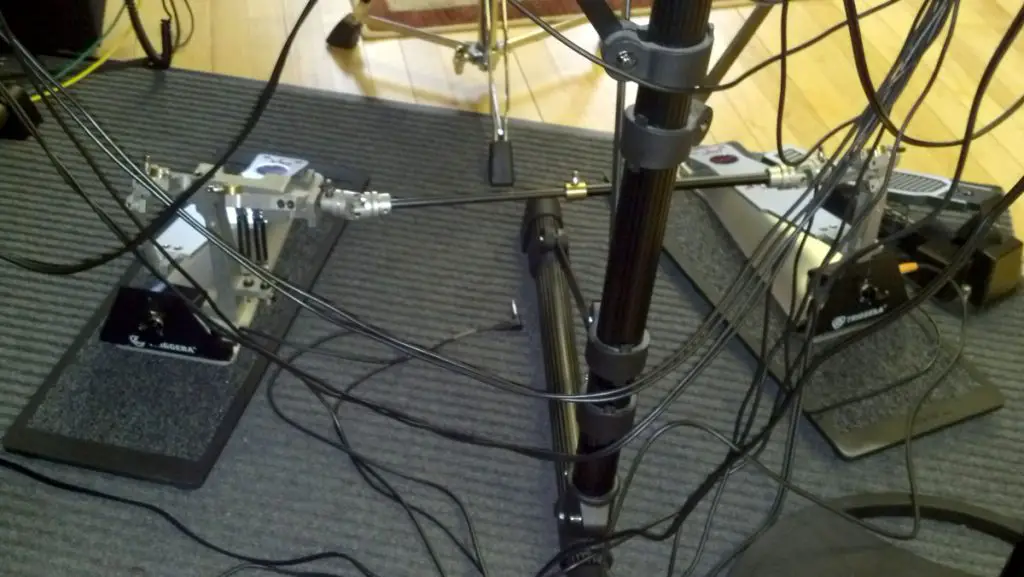
Practice Pad Noise Isolation
Personally, when I’m using my practice pad I have it sitting on top of a folded towel on the island countertop in my kitchen area. I can hammer on it pretty hard and no vibrations go into the counter top and down to the floor. I’ve never had a complaint from downstairs while playing the pad this way.
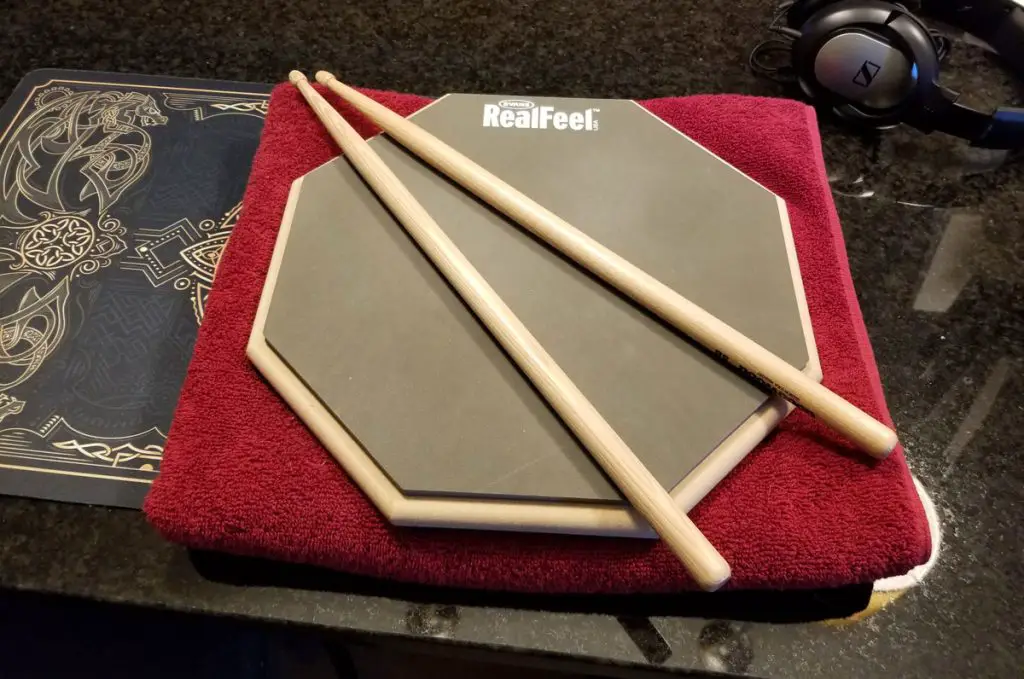
Electronic Drum Kit Noise Isolation
An electronic drum kit is a little trickier to isolate from the floor. But there are options. You can buy noise isolation pads for drum pedals, such as the Roland NE-10 pedal isolation pads, which can help.
You can also build a full noise isolation platform to put your electronic drum kit on top of, which works great but takes a lot more work.
Drum Kit Positioning and Placement
It’s best to keep your drum kit or practice pad away from walls that you share with neighbors. Ideally, use a central room that doesn’t share any walls with neighbors. However that will be hit-or-miss depending on the apartment you live it.
Some examples of the best electronic drum kit placements I’ve had in my apartments include:
- Placing the kit in my living room which only shared a wall with the hallway. When I was playing the kit, you could only hear the pads tapping from the hallway and not any of the adjacent units.
- Placing the kit in a centrally located bedroom. I had one apartment where one of the bedrooms didn’t have any walls shared with neighbors. It was also a ground floor unit. Putting the electronic kit in this centrally located room was the best location I’ve ever had, apartment-wise at least, and I never had any complaints from neighbors even when playing at night.
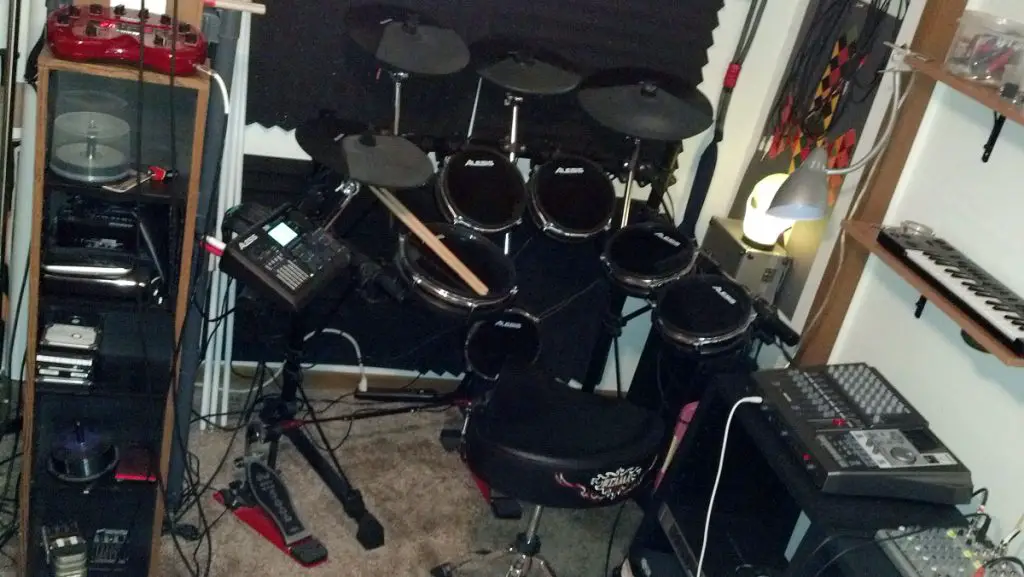
Conclusion
As you can see, there’s some things you can do to make it possible to keep drumming even if you live in an apartment.
Basically, just try to find ways to keep from annoying your neighbors. Don’t be a jerk if you get confronted, and be willing to work with your neighbors if you need to.
You might need to experiment a bit and invest in some gear to make it work, but it can be satisfying to work out the problems and keep cruising as a drummer.

